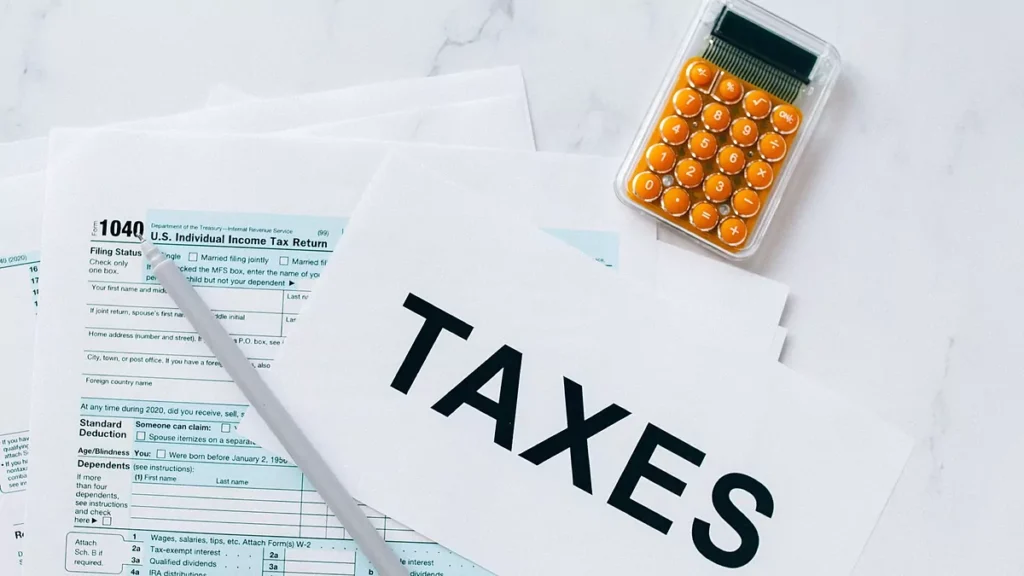
Two things are inevitable in life: death and taxes. And taxes don’t go away just because you are currently incarcerated. If an inmate makes enough income while incarcerated, they must file taxes like everyone else.
The last thing you want when incarcerated or getting ready to re-enter society is a tax evasion charge to occur. If you would like more information about how not paying taxes can lead to jail time, you can read it here.
Being incarcerated is difficult enough without being confused about taxes. This article will help outline the ins and outs of filing taxes under the circumstances of incarceration or upon re-entering society after a stint in prison.
Filing Taxes While Currently Incarcerated

If you are currently incarcerated, you may have taxes due from previous years. In addition, many prisons allow inmates to work and earn income. While this income is very small, usually ranging from $0.14 to $1.41 per hour, if an inmate makes at least $12,200 in a year, they must file taxes.
Whether you need to file for previous years before incarceration or for current years when you earned income in prison, there are options for you. If you will only be in prison for a short period of time, you can apply for an extension which can give you an additional six months to file taxes.
If you will be in prison for a longer period of time, you have a few options. The prison you are staying in may have an in-house lawyer or tax specialist assigned to help prisoners with their taxes. You can ask the warden or a member of the staff to help you get in touch with this person.
Additionally, you can give Power of Attorney to a trusted individual in your life. Power of Attorney means giving someone authority over all legal and financial matters in your life. Once you designate someone as Power of Attorney, they can gather documents and file your taxes.
Finally, if your spouse is not incarcerated, they can file taxes for you, but you will still have to sign them. Your spouse can bring them into the prison or mail them to you for signing. There are many options for incarcerated individuals when it comes to filing taxes.
Filing Taxes When Getting Ready to Re-enter Society

Re-entering society after a stint in prison can be difficult, so it is important to be as prepared as possible. If you are getting ready to re-enter society, check with the prison officials at your location to see if they have the Prisoner Re-entry Tax Education Program.
This program was created by the IRS to help prisoners learn everything they need to know about filing taxes after leaving prison. It is available to prison officials, halfway houses, and other community organizations, so check your local area because this program is very helpful.
The thing to remember is that if you still owe taxes from before you were incarcerated or you earned enough income while incarcerated, you are still responsible for filing those taxes after your release. You may benefit from free tax assistance services, which are detailed below.
There Are Free Tax Assistance Services Available to Help You

There are several free tax services that you may be able to take advantage of while incarcerated. If your yearly earnings are less than $57,000, you can apply for Volunteer Income Tax Assistance or Tax Aide. These services provide free in-person tax preparation services for those eligible.
If the prison in which you are staying has a computer lab, you can take advantage of free virtual filing services such as Code for America. This fully virtual process connects you with an IRS-certified volunteer to help walk you through the process of filing your taxes.
This service is free for anyone who makes under $66,000 per year and helps users prepare, review, and file taxes with ease. Please take advantage of these free services if you can to ensure that your taxes are filed properly. This helps avoid any legal action being taken against you.
There May Be Tax Credits Available For You

Unfortunately, while incarcerated, you are not eligible for tax credits such as the Earned Income Tax Credit or the Child Tax Credit. That doesn’t mean you aren’t eligible for any tax credits at all, though.
If you earned income before incarceration or if your spouse earns income while you are incarcerated, you may be eligible for certain tax credits. It is recommended to check with a tax specialist to see what tax credits you and your spouse may be eligible for.
During Covid, the government sent out multiple stimulus checks, which included incarcerated individuals. If you did not receive your stimulus checks or received the wrong amount, you can claim the Recovery Rebate Credit when you file your taxes.
Conclusion
Incarceration is the result of a crime committed. It may feel like your life is on hold, but the IRS doesn’t see it that way. Despite being confined to one place, inmates are still responsible for filing taxes when necessary.
Taxes due before incarceration don’t simply go away. Incarcerated individuals are responsible for filing taxes on any eligible income earned before their sentence began. Inmates who earn enough income while incarcerated are also responsible for filing taxes.
Luckily, you are not on your own. There are several programs available to help you understand your current tax burden and to help you file accordingly. The IRS has a whole program dedicated to helping prisoners learn about filing taxes upon re-entering society.
It is crucial to learn as much as you can because if you file incorrectly, you could be audited, or the IRS can take legal action against you for taxes owed. There is no need to go back through the legal system over something avoidable like tax evasion.
If you are unsure where to start with your taxes, please check out some of the sources mentioned in this article. These sources are there to help you whether you are currently incarcerated or getting ready to re-enter society.




